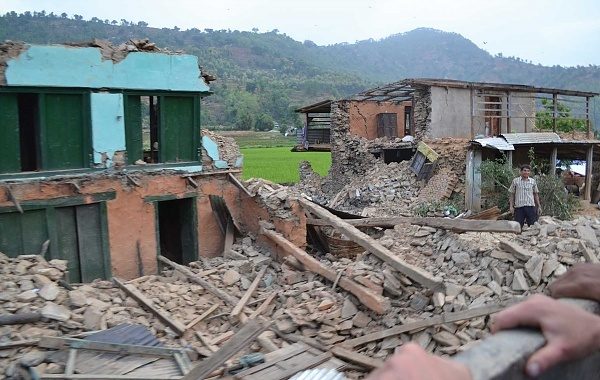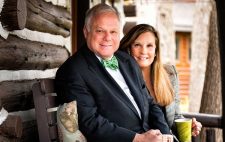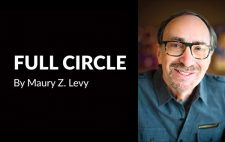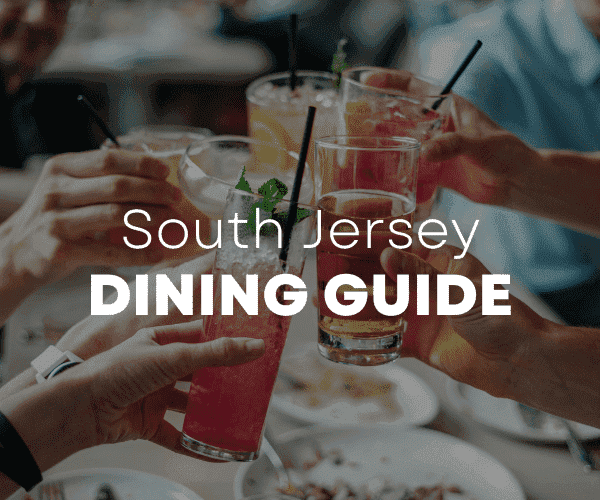Kate Ercolani and her friends were sitting in an Internet café in Kathmandu just before noon on April 25 when a magnitude-7.8 earthquake rocked the centuries-old city. The 26-year-old Haddonfield resident remained in Nepal for four days after the earthquake, riding out aftershocks and trying to help the decimated city and its population any way she could.
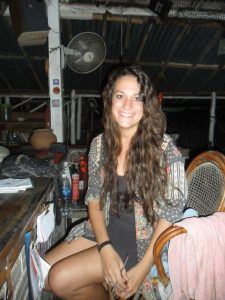
Haddonfield’s Kate Ercolani
Do you remember the moment when the earthquake hit?
I’m pretty sure I will never forget. There’s a restaurant we always went to for Wi-Fi called Electric Pagoda. That morning, two friends and I went there for breakfast. I was reading, and they were online looking up a flight. All of a sudden there was a rumbling noise and a big gust of wind. Birds flew up in the air and the cup of tea I had started rattling. At first, we all just looked around to see everyone else’s reactions. Everyone started to run toward the courtyard area, grabbing trees. For what felt like ages you couldn’t get your footing and everything was falling off the walls. After about a minute the earth stopped shaking, and everything was so quiet. At first, nobody said, “That was an earthquake.” You know it happened, but you don’t want to be the idiot who’s being overdramatic. We waited for about 25 minutes, and there were small aftershocks. When they died down, we headed outside.
What happened after you left the café?
We went walking back to the guesthouse where we were staying. Right outside the restaurant there was a white car. The bricks from the top of the building we were in had fallen onto the driver’s side and smashed it in completely. There were wires down, and people were running everywhere. My friend and I just started running; we really started panicking then. We got to the corner, and there was house after house in piles. We had to climb over houses. On one corner they were digging and digging because rubble had fallen on a taxi. When we got to where we’d been staying, a big aftershock – a 5.5 or something – hit, and we all huddled down until it stopped.
When did you realize this was a large-scale disaster?
Everyone we’d been staying with was out in a field next to the guesthouse. All the locals were gathered there too. We spent about two hours sitting in the field, and during that time we had no idea what was going on. There was no power and no one’s phone was working. Eventually we put on motorcycle helmets and went out to try to help. Everything was demolished. As we were walking into the center of the city, there was this pathway that led into Kathmandu Durbar Square, which is one of the most well-known places in Kathmandu. I was one of the first in the group to get to this pathway, and it was blocked – there were just piles of bricks, and beyond that I could see all the buildings in ruins. I looked back at everyone and was like, “Is that Durbar Square?”
When I saw Durbar Square, and how devastated it was, that’s when I knew it was bad. It really makes you feel so small in the world when you step outside and see homes, businesses and livelihoods crushed around you.
When you were finally able to reach your family, how did they react?
The first night someone had a phone that was working, and you could get through but really only to say, “Hi, I’m OK.” It was about 3 or 4 in the morning in the U.S. when I called my mom. I debated for a while after the big one whether or not I should call her. I didn’t want to freak her out. But if you wait, you’re risking not being able to call later. I called when I got back from Durbar Square, and I was really shaken up.
I said, “I just want to let you know – don’t panic – there was an earthquake, but everyone’s OK.” She said, “OK. Where are you?” She was really calm. I said, “Mom did you hear what I said? There was an earthquake.” Then she started panicking and freaking out, but she couldn’t hear anything I said after that. And then she couldn’t get back in touch with me, and I knew she was going to go right to the computer.
The first thing that happened when all the power came back on was everyone who had an iPhone with Facebook got messages saying, “You’ve been in an earthquake, log on and let your friends know you’re OK.” So we all went on.
Wi-Fi was very sporadic. I was texting with my mom and my brother that first night, but there was aftershock after aftershock, and each one causes panic and you can’t talk to your family for a while after that. Once the generators ran out of diesel there was no more Wi-Fi. Even the U.S. Embassy didn’t have Wi-Fi or a landline for a long time.
Was it difficult to stay calm when you didn’t know what would happen next?
A lot of the locals had the radio on, broadcasting in Nepali, but we couldn’t understand that, and a lot of that information wasn’t actually right. People kept saying, “The next one is coming at this time,” and often that was wrong. Information was sparse. Eventually we were getting newspapers; we didn’t know until the second night that there’d been an avalanche on Mount Everest.
On the second day we had a magnitude-6.7 aftershock, and that night we had massive hailstorms. You’re lying there listening to the hail, and you know that’s causing more destruction. There was constant fear – you’re scared and you’re surrounded by people who are scared. There was a massive, brand-new building right next to the guesthouse that had a huge crack in it. Everyone knew that building could come down on us at any moment. You fall asleep knowing you’re not in the clear. The next morning you’re having breakfast and hear a house come down a block away. It makes you think how little control you have over your fate; you’re watching the death toll go up and up. You feel lucky, but you’re also very aware that your own odds are going down.
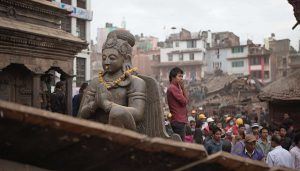
The death toll in Nepal surpassed 8,500 in the days after the quake
What was it like working with the rescue and clean-up teams?
When I saw the first pile of rubble and realized it was all that was left of someone’s house, I knew immediately they were going to need all the help they could get. After a few aftershocks, the woman who runs the guesthouse came to us and said, “If you want to help, we need you. Come and help.”
My thought was that if I could be of any help at all, I was going to try. We were working alongside the locals to clear collapsed buildings. We formed lines to pass the rubble to each other. We stayed for a while helping, and we saw a lot of people get dug out.
When did you decide to go home?
We were trying to help, but it was really overwhelming. We started to feel like we weren’t being useful, because we didn’t understand the language and couldn’t take orders. I can’t speak Nepali, I can’t do first aid – I’m not equipped with that kind of skill set. It started to feel like we were using up food and supplies that could’ve been going to people who needed it more than we did.
On day four I found a generator and Wi-Fi, and I FaceTimed my mom and said, “I think I need to come home.” After something like that it feels appropriate to go home and see your family. By day four I just didn’t want to be a burden on the country anymore. I asked my mom to book me a flight.
Tell us why you’ve been posting about the ongoing need in Nepal on social media.
I’m still shocked when people don’t know there was an earthquake, let alone a second one just a few days later. People who haven’t seen it firsthand are sad about it, but they don’t realize the gravity of it. People there are living day by day; their businesses are destroyed. So now what? The situation is very dire – people’s livelihoods have been demolished. They were already at the top of the world’s most impoverished countries, and now their lives have been smashed to bits. They really need help. I want to keep people helping, donating and doing what they can.
How has the experience in Nepal changed you?
I want to take a first aid course. I want to make sure the next time something like this happens I’m prepared and helpful. I’d never even thought, “What if that happened?” Now it has, and I want to make sure I’m more useful next time.
The reason I was in Nepal in the first place is that I’m traveling to find out what I like and what I want to do. I was doing fundraising while living in Cambodia before my trip to Nepal, and I’m enjoying this now. I think it’s a nudge – by me experiencing the earthquake, maybe that means I’m supposed to be using my life to help people in situations like this one.
Will you keep traveling?
For a while, I want to stay home in Haddonfield and work. I’m saving money to move to Australia. Once I’m there, I’ll get a job to pay the bills and then start working toward something career-based. I don’t know how long I’ll stay in Australia – we’ll see how I feel when I get there. I may want to keep traveling and learning until I find where I actually belong. Maybe that will be somewhere I can work to help people who need it. I’ve learned not to make plans, because nothing is ever as you plan it.

